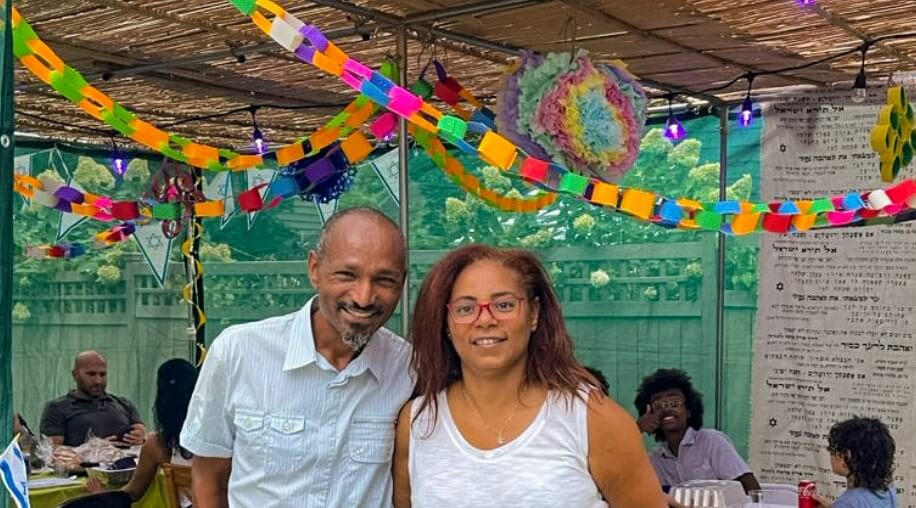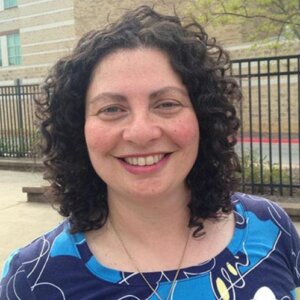Sharing communal sukkot during the ‘Holiday of Shade’
In the Ethiopian celebration, families join together in a community sukkah

Graphic by Angelie Zaslavsky
Every Jewish community has its customs, some more distinct than others, but they are all more than simple curiosities. Each tradition is a chance to expand our understanding of Judaism and to deepen the expression of Jewish values. For example, the unique ways that Ethiopian Jews celebrate Sukkot have much to teach others how they can build modern Jewish communities where everyone, regardless of age or status, knows that they belong.
For over 2,500 years, Ethiopian Jews were disconnected from other Jewish communities. Nonetheless, the Beta Israel, as Ethiopian Jews are called, remained strongly connected with Jewish ritual and prayer. The depth of faith sustained the community when they faced challenges, and Beta Israel developed ways of embodying the traditions.
The Beta Israel refer to Sukkot as Baal Matzelet, or the Holiday of Shade, because of the custom of sitting in the shade of the schach, the plants that cover the sukkah. In ancient times, the people of Israel would go to Jerusalem to celebrate Sukkot together. This custom was a model that permeated Ethiopian Jewish society throughout the generations. Instead of having individual family sukkot, a singular large sukkah would be erected for the entire community. One family would host the sukkah, but it was a shared resource for all.
During Sukkot, people would step away from their daily work, weaving, making pottery, harvesting, cooking, or working the fields. This quieter time meant people could visit the sukkah and connect with friends and family. Sometimes people would go to see friends in the sukkot in other villages. Young and old, wealthy and poor, men and women, would come together.
Whatever time of day they arrived in the sukkah, there was nourishment for body and soul. The hosts would provide food, and visitors would bring whatever they could. Those who did not always have food knew that during Sukkot, they would have food all week. But people did not just grab a plate and eat. They would take food and then approach the Quesoch, the religious leaders, or the Shmaglotz, the elders who would offer words of wisdom and blessing.
These blessings were meant to help bring the community together. These were the days of preparation before Sigd, a special holiday in the Beta Israel community, and the leaders would use this gathering time to address communal needs and speak to the value of being in relationship with each other.
In moving to Israel, this vibrant communal element of Beta Israel Sukkot observance was transformed by the encounter with the custom of sukkot in individual family homes. Today, members of the Beta Israel community throughout the state of Israel maintain a connection with the past by individually hosting large gatherings open to all. While many Jewish communities worldwide have communal Sukkot — perhaps your own shul does — the difference is that the Ethiopian community has not traditionally had family or individual sukkot as well. The community sukkah is the sukkah.
It is worth understanding the power of the communal sukkah and the way the holiday has been traditionally celebrated in Ethiopia, especially as modern Jews wrestle with how to create communities of belonging. The historic Beta Israel celebration of Sukkot was a model of the best version of a community if only a temporary one. All were welcome in the communal sukkah, regardless of age, gender, wealth, or ability to contribute. There was no need for tickets or the right kind of clothing. Those who usually did not keep company with each other sat shoulder to shoulder in the sukkah, an inspiration in these politically divided times. For one week, those who may in regular times experience hunger or need got enough food.
We all need access to the resources that help us live with basic dignity. And the spiritual riches of the community were accessible by every person equally. It was a time when the leaders would help people talk about what it meant to be in community with each other. Notably, people took the time to step away from the norms of daily life and invested in each other. Creating communities of belonging happens only with investment and intention. While these customs were particular to Sukkot, they set out for everyone a vision of what it can look like when we all come together as equals and have our needs met.

















